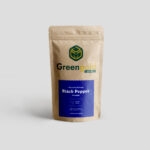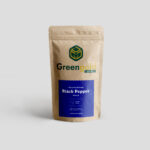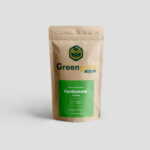As organic farming gains popularity, getting organic certification for cardamom is essential for farmers looking to sell in premium markets. Certified organic cardamom fetches higher prices, gains consumer trust, and supports sustainable farming. But how do you get certified? Let’s break it down step by step! 🚀
🌱 1. Why Get Organic Certification for Cardamom?
🔹 Higher Market Value – Organic cardamom sells for a premium price.
🔹 Export Opportunities – Many countries require organic certification for imports.
🔹 Better Soil & Plant Health – Organic farming practices improve soil fertility.
🔹 Consumer Trust – Certified products are preferred by health-conscious buyers.
💡 Tip: Major markets like Europe, the US, and the Middle East demand certified organic spices! 🌎✨
📜 2. Types of Organic Certifications for Cardamom
Organic certification depends on where you want to sell your cardamom. Here are the key certifications:
🌍 A. India – NPOP Certification
🔹 Issued by: APEDA (Agricultural & Processed Food Products Export Development Authority)
🔹 Required for: Domestic sale & exports from India
🔹 Certifying Agencies: Indocert, ECOCERT, OneCert, IMO Control, etc.
🇺🇸 B. USA – USDA Organic Certification
🔹 Issued by: United States Department of Agriculture (USDA)
🔹 Required for: Exporting organic cardamom to the US
🔹 Must comply with National Organic Program (NOP) standards
🇪🇺 C. European Union – EU Organic Certification
🔹 Issued by: EU-approved certification bodies
🔹 Required for: Exporting organic cardamom to Europe
🔹 Must comply with EC 834/2007 & EC 889/2008 regulations
🇯🇵 D. Japan – JAS Organic Certification
🔹 Issued by: Japanese Agricultural Standards (JAS)
🔹 Required for: Selling organic cardamom in Japan
💡 Tip: If you plan to export, it’s best to get multiple certifications (like USDA + EU Organic)! 🌿📦
🛠️ 3. Steps to Get Organic Certification for Cardamom Farming
✅ Step 1: Follow Organic Farming Practices
Before applying, ensure your farm follows 100% organic practices for at least 2-3 years (conversion period). This includes:
✔️ No chemical pesticides or synthetic fertilizers
✔️ Use organic compost, green manure & bio-fertilizers
✔️ Natural pest control methods (neem oil, companion planting)
✔️ Crop rotation & soil conservation practices
✅ Step 2: Choose an Organic Certification Body
Each country has approved certification agencies. Some popular options:
🔹 Indocert (India)
🔹 ECOCERT (Global)
🔹 Control Union (Europe & USA)
🔹 OneCert (India, USA, EU)
💡 Tip: Check if your buyer prefers a specific certifier before applying!
✅ Step 3: Apply for Certification & Submit Documents
Once you’ve selected a certification agency, submit:
📌 Farm details (location, size, crops grown)
📌 Farming records (fertilizer, pesticide use)
📌 Organic input purchase receipts (compost, biofertilizers, etc.)
📌 Previous harvest reports
💡 Tip: Keep records of everything! Auditors will verify compliance. 📋
✅ Step 4: Farm Inspection by Certification Body
An organic certifying agency will conduct:
🔎 On-site farm visit to check practices
🔎 Soil & water testing for chemical residues
🔎 Verification of input sources & storage
💡 Tip: Inspectors may visit without prior notice, so always be ready! 🚜
✅ Step 5: Certification Approval & Organic Labeling
If the farm meets organic standards, the certification agency issues an organic certificate. Farmers can then:
✔️ Use the organic label (NPOP, USDA, EU Organic)
✔️ Sell cardamom as “Certified Organic” in domestic & export markets
💡 Tip: Certification is valid for 1 year and must be renewed annually! 🏷️
💰 4. Cost of Getting Organic Certification
The cost depends on farm size, certifier, and country. Estimated costs:
📌 Small Farms (1-5 acres) – ₹15,000 – ₹30,000 ($200 – $400)
📌 Medium Farms (5-20 acres) – ₹30,000 – ₹75,000 ($400 – $1,000)
📌 Large Farms (20+ acres) – ₹75,000+ ($1,000+)
💡 Tip: Some government subsidies are available for organic certification! 🌱💵
📈 5. Organic Certification Renewal & Compliance
To maintain certification, farmers must:
✔️ Follow organic practices continuously
✔️ Maintain detailed records of farm activities
✔️ Undergo annual farm inspections
✔️ Avoid contamination from nearby chemical farms
💡 Tip: Some certifiers offer group certification for farmer cooperatives, reducing costs!
🛒 Where to Sell Certified Organic Cardamom?
Once certified, farmers can sell organic cardamom in:
🏪 Organic Stores & Supermarkets
📦 Export Markets (Europe, USA, UAE, etc.)
🌐 Online Marketplaces (Amazon, Flipkart, Organic eCommerce)
🚜 Direct to Consumers (Farmer’s Markets, Subscription Boxes)
🔗 Sell your organic cardamom here: Greengold Guide – Buy Organic Cardamom 🛒💚
🎯 Final Thoughts
Organic certification may take time & effort, but it helps farmers get better prices, access premium markets, and support sustainable farming! 🌱












